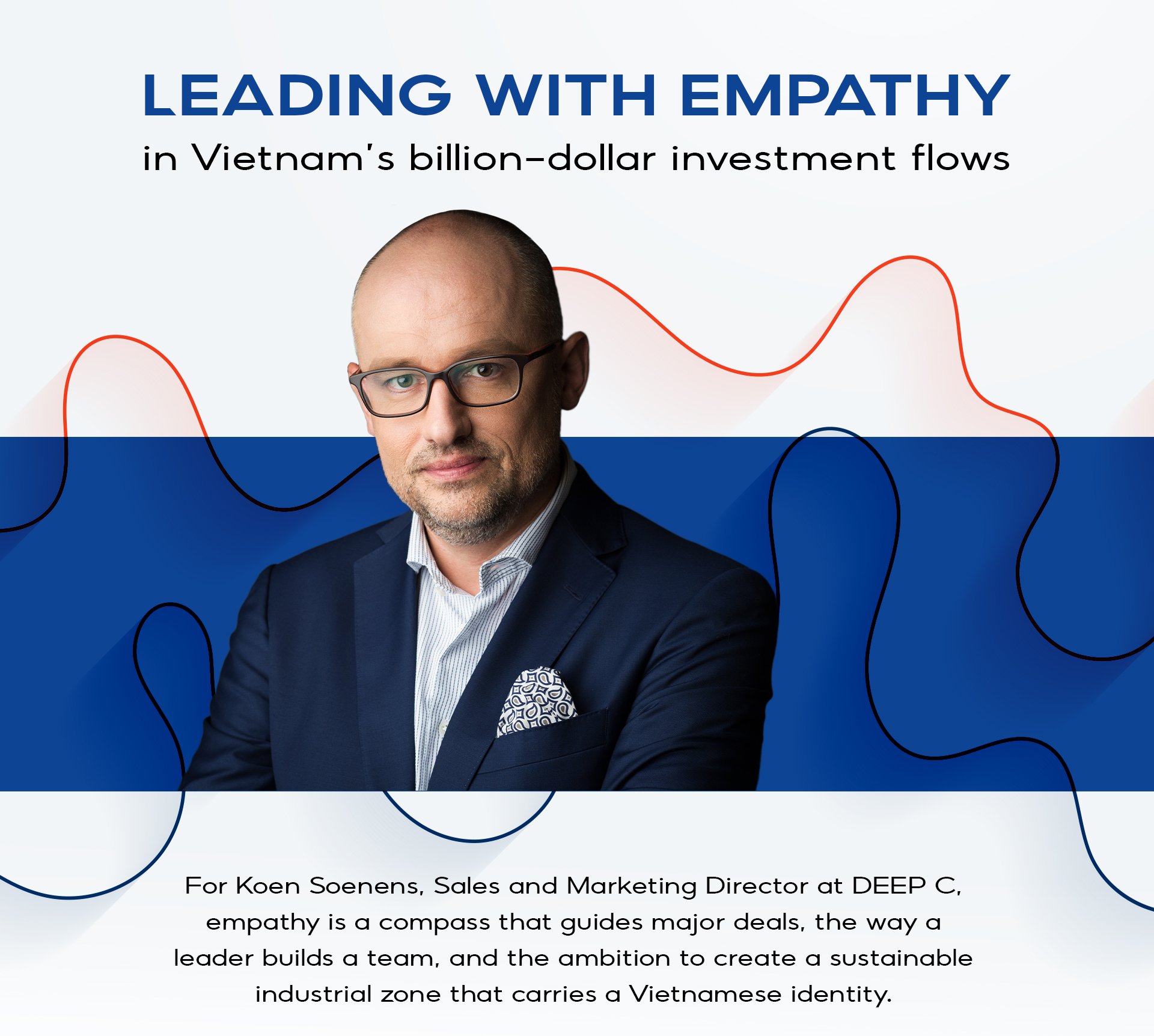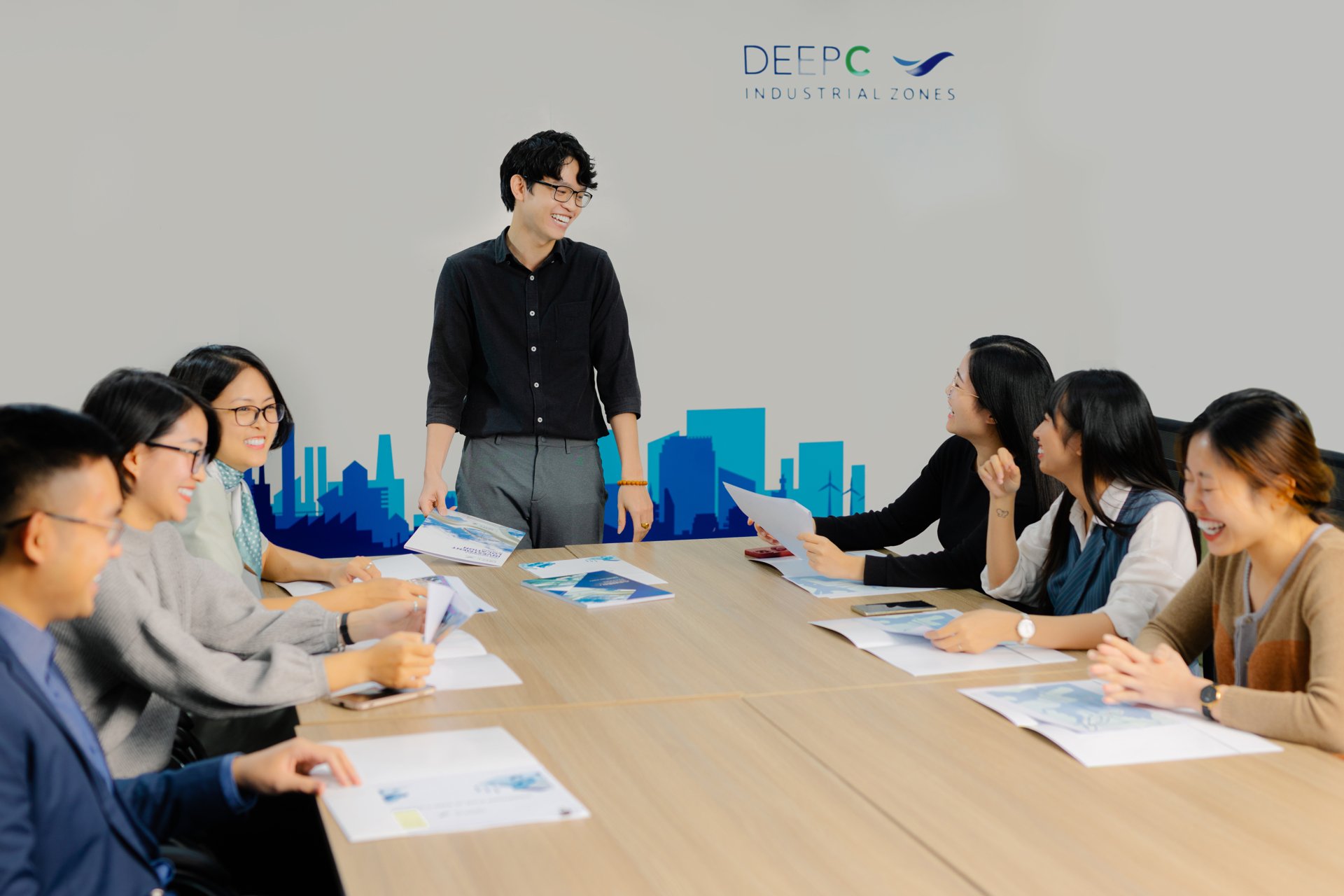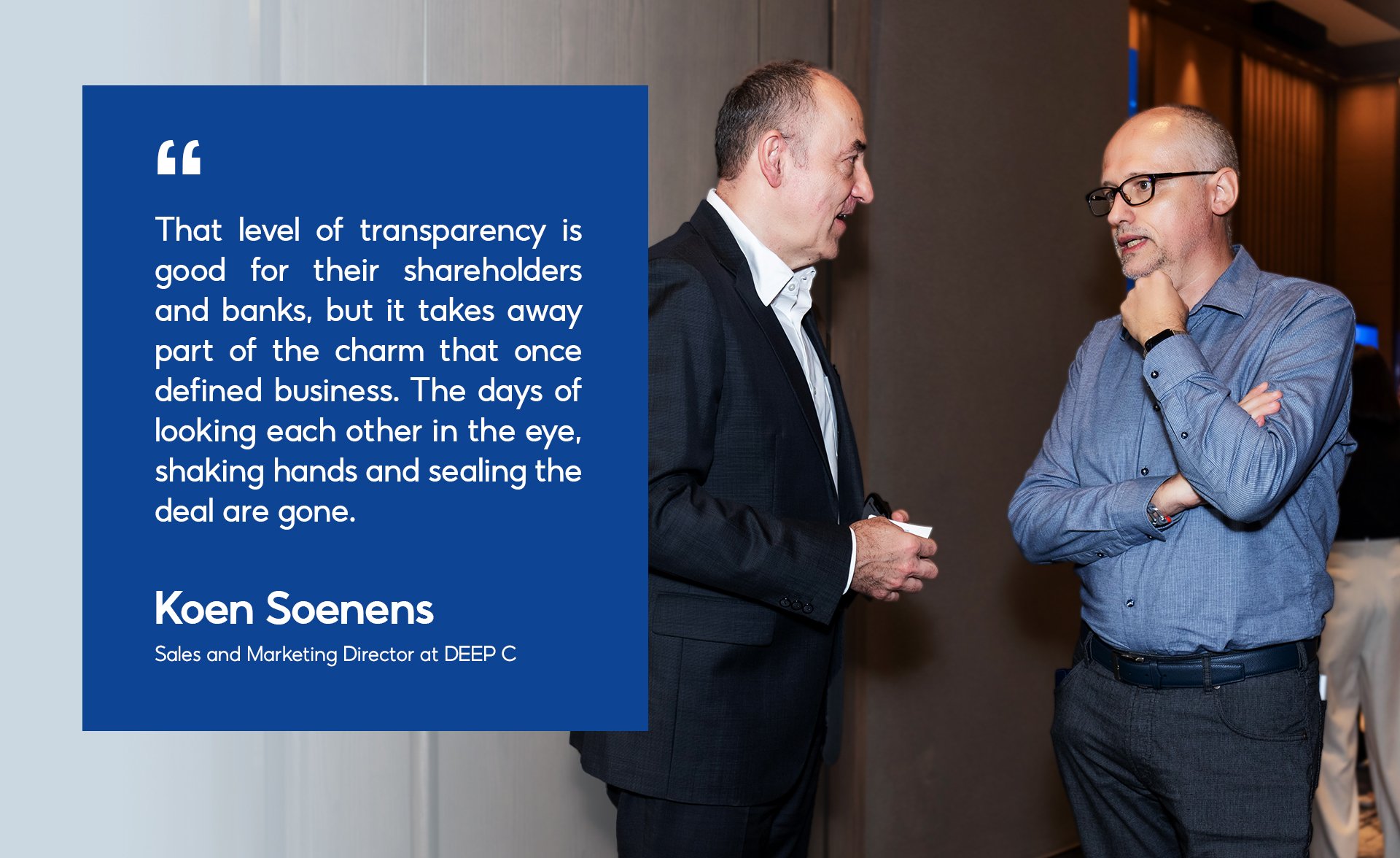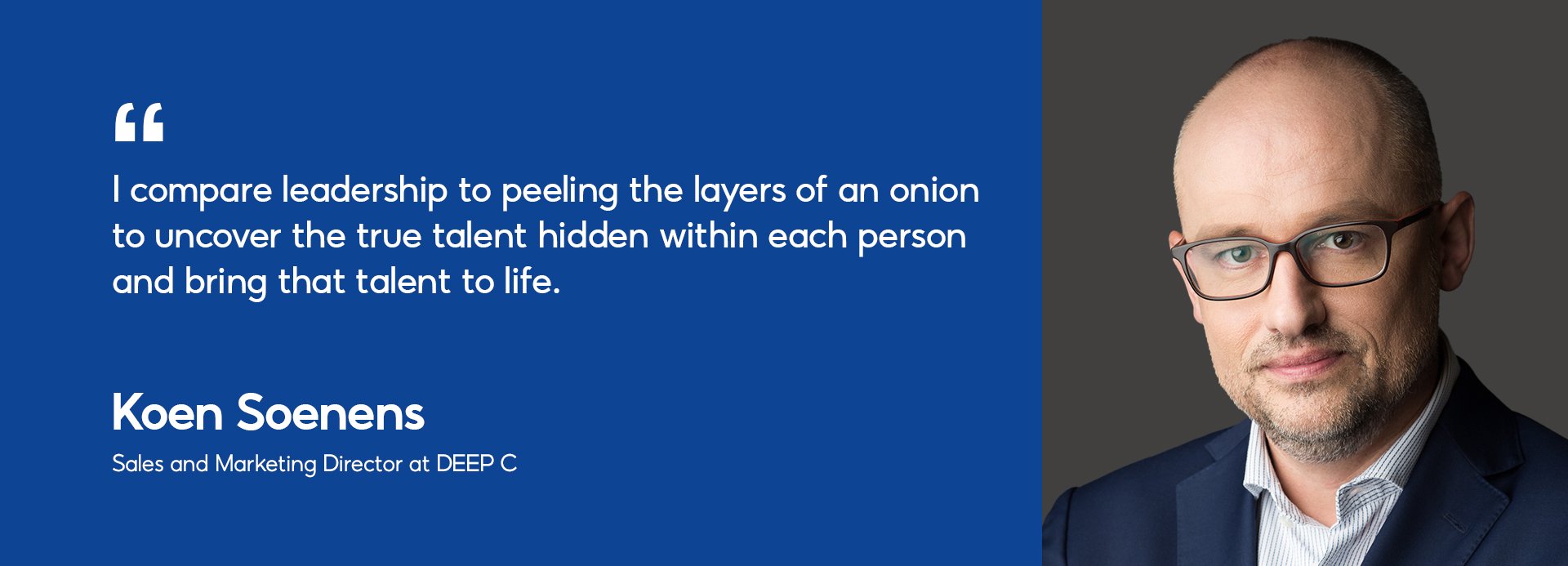

On the second floor of a French colonial restaurant in central Hanoi during a summer day in July 2025, Koen Soenens takes a deep breath. The air is a familiar mix of humidity, a light sweetness from the food, and a trace of the city’s gritty dust. Although he was born and raised in Belgium’s temperate climate, life in Singapore and Vietnam has given him the strange feeling that he once belonged to a tropical land, even though he does not believe in reincarnation.
Sensitive by nature, Koen is easily moved by a detail that others may not even notice. A word, a melody, even a small feature of a painting on the wall can send his thoughts far away.
“That sensitivity sometimes brings me joy because it helps me discover beauty in small things and seek balance amid the immense pressures of work,” he says.
After six years in modern Singapore, he left to seek new challenges in Vietnam, a place still raw but full of promise. Together with DEEP C’s Belgian CEO, he carried the goal of driving strong growth and writing a story that would elevate the company.
Then the COVID-19 pandemic hit. For two years, welcoming investors to Vietnam was almost impossible and he could not travel abroad to find partners. For a business that depends heavily on foreign direct investment like DEEP C, the impact was significant. For the sales and marketing team, the challenge was even greater.
For Koen personally, those months were harsh and suffocating, as if he were confined in an invisible cage. The energy he had stored, the eagerness to act and the desire to bring about change had to be suppressed. He risked falling out of step with the opportunities waiting to unfold.
When the pandemic eased, new disruptions came. Geopolitical instability, ongoing trade tensions between the United States and China, a major typhoon last year, and shifts in U.S. tax policy this year, all directly affected his work of attracting investors.
He chose not to dwell on misfortune but to stay positive, believing that after a bad day a better one would come. It might take time, yet things would improve.
“Without those difficulties, the job might have become too easy and lost its sense of challenge. It is the unexpected turbulence that truly helped me grow and strengthened my ability to recover quickly after setbacks,” he shares.
The results tell the story. Vietnam has become an attractive investment destination. DEEP C has proven itself as a professional company. The company’s sales and marketing department has operated effectively. Koen has worked tirelessly. In the past six years, they achieved more revenue than in all the previous years combined since DEEP C entered Vietnam in 1997.
Even in his very first year at DEEP C in 2020, the same year the pandemic broke out, Koen led the business team to achieve record sales in the company’s 23-year history. They attracted 19 manufacturing projects with total registered capital of $900 million.

As the focal point for promoting and realizing FDI inflows into Vietnam, DEEP C by the end of 2024 had attracted more than 170 projects with total investment of over over $8 billion. Its ecosystem of five industrial zones covers 3,400 hectares in Hai Phong and Quang Ninh. The years 2023 and 2024 marked a breakthrough in high-tech investment, with Foxconn committing $287 million to DEEP C Quang Ninh II last year, following Pegatron’s arrival in 2020.
Few would expect that Koen, the man behind multimillion-dollar contracts, is not a typical flamboyant salesman. Even being able to represent the company as a speaker at major events, showing an open and flexible side as he does now, has been the result of constant effort. As an introvert who has spent three decades devoted to his profession, Koen breaks every stereotype about sales. For him, one of the common mistakes salespeople make is talking too much.
“People think sales is about speaking, but in reality it is about observing and listening. How can I persuade you to buy if I do not know who you are, where you come from, what you need, how you think,” he says.
Rather than focusing on introducing DEEP C’s industrial zones or highlighting the advantages of Hai Phong and Quang Ninh in meetings, he prioritizes understanding the person sitting across from him.
“Our work is about people. We can talk for hours about money, land, electricity, water, but none of that matters unless we understand the people behind the investments,” Koen shares.
In the past, closing a deal could be swift and simple, sometimes over drinks at a bar or dinner at a restaurant, with just a few conditions scribbled on a piece of paper and a handshake. He has a special fondness for working with family-owned companies, where he can meet founders who started with nothing and through decades of hard work, investment and innovation, expanded their businesses globally. They value the meaning of a handshake and a promise, even before any contract is signed. They maintain a deep emotional bond with their enterprise.

Koen observes that sometimes the decisive factor for a deal is an indescribable sense of belonging to the land where they are standing, as if it is the place meant for them. For him, working with clients is not only about numbers or ticking boxes of criteria but about feelings and resonance in business.
Today the decision-making process has become far more complex and rigid as the client base has expanded, and in many cases no single representative has the authority to decide. Everything must be reported back to headquarters, where those in charge may not truly understand the local market.
“That level of transparency is good for their shareholders and banks, but it takes away part of the charm that once defined business. The days of looking each other in the eye, shaking hands and sealing the deal are gone,” Koen says.

To make up for this, he and his team build personal relationships with both the representatives they meet in Vietnam and the actual decision makers abroad, because that is the way to sustain long-term cooperation. They understand the worries and pressures faced by Japanese, Korean and Chinese representatives sent by their chairmen with large budgets and the mission to build the best factories.
Koen compares DEEP C to a pharmacy that must always have the right medicine available for the client’s headache. The only concern left for the investor should be when the plant can start production and generate profit.
“Clients always come with the expectation that everything is ready. And that is the mindset I have gradually instilled in my department,” Koen says.
Anticipating the rising demand for sustainability, DEEP C has consistently pursued the eco-industrial park model. Beyond sensors and automation technologies, the company invests in workforce training, community engagement, and comprehensive support services for investors.
As part of the eco-industrial park initiative carried out by the Ministry of Planning and Investment, now the Ministry of Finance, in collaboration with UNIDO, DEEP C and its investors have implemented 137 resource efficiency and cleaner production measures, reaching 83 per cent of the global eco-industrial park standard. From energy savings and wastewater reuse to reducing emissions across its campuses, every small change contributes to building a sustainable industrial ecosystem.
“This is why DEEP C has built a very special client base, people who trust us, stay with us and more importantly become ambassadors who spread the values of DEEP C,” Koen proudly says.
Asked what makes an industrial zone create that sense of belonging for clients, he explains that the first step is to treat them as people rather than numbers, even if each customer has a code in the accounting system. Consistency and transparency in communication, combined with respect and empathy, are what make clients want to stay for the long term.
“We must continue to grow stronger, but we cannot lose our DNA. We are not only an industrial park, we are a provider of complete solutions for investors. If we lose that identity, the DEEP C brand will collapse very quickly,” Koen says.

DEEP C is an ambitious company with strong financial foundations and the backing of major shareholders. The company makes no secret of its goal to become a model of the new generation of industrial zones in Vietnam. Yet to realize that vision, the decisive factor remains people, especially in the midst of an intense war for talent.
For someone as deeply introspective as Koen, the pressure of sales targets is only the surface. The greater challenge lies in leading a team, working with people across cultures and generations. That is the hardest part, demanding empathy and consuming much of his energy.
“When I look around the office, I see 30 people and behind them I see 30 families,” Koen reflected. His personal responsibility, as he puts it, is to make sure each person feels their work has meaning, that they can grow into a more professional version of themselves, and that they are given opportunities to move forward.
In his early days at DEEP C, Koen asked CEO Bruno Jaspaert for 100 days simply to observe. During that time, he hardly spoke, choosing instead to listen, to watch, and to understand the lives of employees. A person with young children, someone going through a divorce, or one living with their parents will work differently from someone single and independent. Each requires a different management approach. From these observations, he pieced together an organization designed to operate effectively on the basis of empathy.
“Empathy is often undervalued in management. Many leaders still favor command and control. That might work once or twice but it will never be sustainable,” Koen remarked.
Rejecting micromanagement, he believes in the power of empowerment. He encourages each employee to manage their responsibilities as if they were running a small business within a larger enterprise. Eastern management culture often expects staff to follow orders without question, yet Koen wants his team to think independently and act autonomously.
He believes employees should be encouraged to challenge ideas, even those of their boss. In the beginning, whenever an issue arose, staff would line up outside his office waiting for instructions. It took years before that changed. What he wanted was for them to walk in with solutions, not just problems.
“I compare leadership to peeling the layers of an onion to uncover the true talent hidden within each person and bring that talent to life,” he explained.

He takes pride in how many team members have grown and developed as he hoped over six years of working together to build DEEP C’s success. For him, the most important role of an expatriate expert is not to occupy high positions but to help Vietnamese staff mature and gradually take on leadership roles themselves.
He believes that one day DEEP C should be led entirely by Vietnamese. The gradual reduction in the number of expatriates in recent years is proof of that, and he is glad to see local staff stepping up.
In Koen’s eyes, Vietnam may still appear rough around the edges, but it is undergoing a remarkable transformation. He sees the spirit and ambition to rise, he feels the energy and passion in the eyes of the young generation. He is impressed by the country’s clear and consistent vision and its growing international stature in both economics and politics. He is confident that future generations of Vietnam will grow up in a prosperous and thriving nation.
Looking ahead, Koen knows that one day his family will return to Belgium. When that happens, he hopes a Vietnamese colleague will be ready to take over his role. Thinking of that moment, he says he will carry two important things with him. One is the respect of colleagues who felt free to grow and thrive under his leadership. The other is the respect of clients. At one investor event, a guest turned to him and said, “Koen, without you, we would not be here.” For him, even if those clients never paid him a cent directly, that moment was enough to affirm why he devoted more than half a decade to Vietnam.
Pointing to the lone logo printed on his business card without the words DEEP C Industrial Zones alongside it, Koen shared that his greatest career aspiration is that one day, the logo alone will be enough for people to recognize DEEP C.
“We must reach that point, to become a trusted, reputable, and successful industrial developer recognized simply by this logo. That logo must stand as the symbol of industrial development in Vietnam,” Koen Soenens says.
Written by Hannah Dang
Designed by Dieu Thao
Published on August 26th


